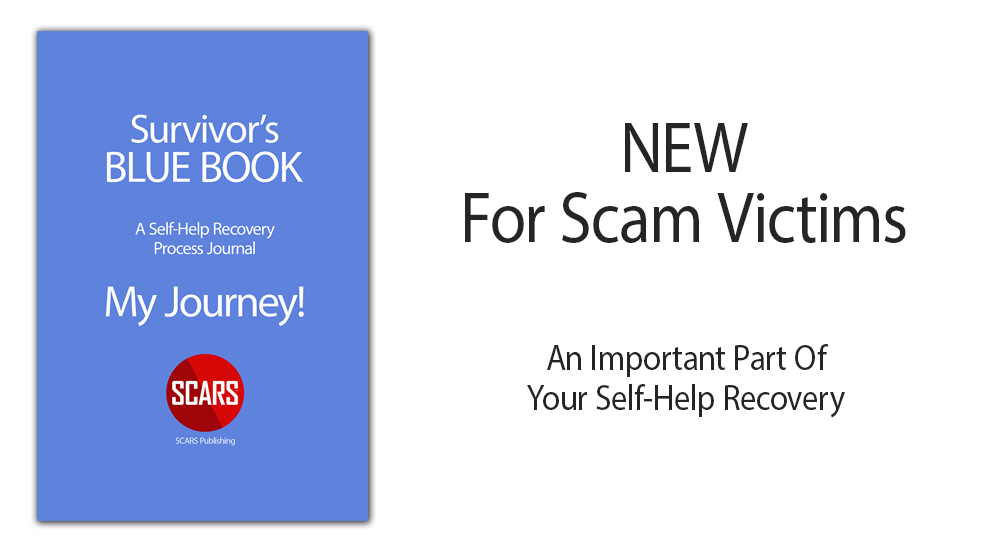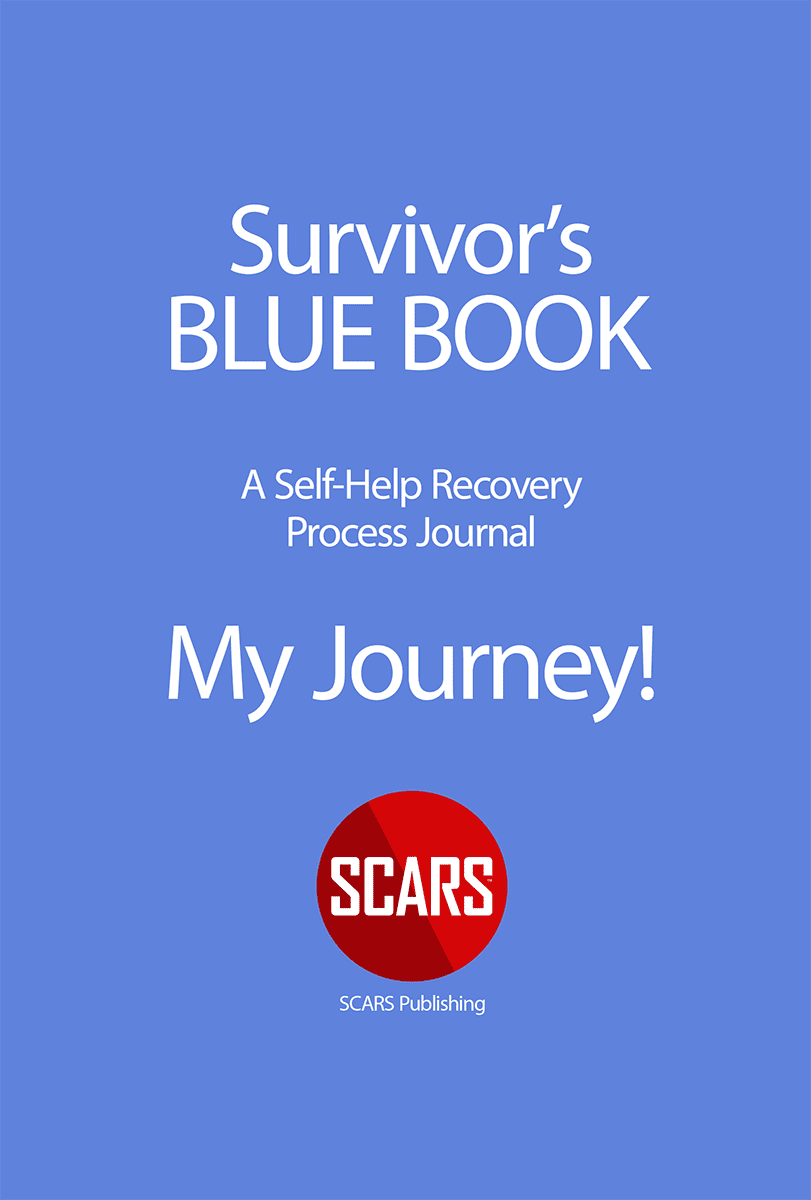The Power of Journaling in Your Scam Recovery
For Scam Victims
A SCARS Self-Help Recovery Program Guide
SCARS BLUE BOOK
Survivor’s Recovery Journal
A Scam Victim’s Self-Help Recovery Journal (Click to View)
Give yourself the perfect tool to measure and track your recovery progress while getting the therapeutic benefit of journaling!
This official SCARS Self-Help Recovery Program Journal allows you to record your journey day by day, to be able to look back and see your progress, and measure your achievements. While this is a difficult time in your life, it will get better in time and journaling is an important way to help you through many of those moments, but also to show yourself how strong you are!
The Official SCARS BLUE BOOK is your way of recording this struggle and help yourself through it,
- 60 pages
- Paperback
- 6×9 inches
- Binding type: Perfect Bound
- Specially Created for Scam Victims
- Designed by SCARS
Your Survivor’s Journey And Your Journal
Journey & Journal share a similar Latin root that translates to “of one day.”
The concept of approaching recovery one day at a time dovetails beautifully with the practice of recording daily journal entries while traveling along this life-affirming journey to recover from your relationship scam experience.
Journaling is a Powerful Recovery Tool
Journaling is a powerful recovery tool that not only allows you to reflect on and record the many facets of your journey but also performs double duty as an aid for processing emotions. Whether the entries are ever revisited again is not important. What makes journaling so therapeutic is its function to heal the spirit.
In addition, keeping a journal is a highly effective coping tool for managing stress and reducing trauma. In recovery, every single action taken to manage stress and anxiety provides greater emotional stability, so journaling should have a prominent place in that toolbox.
Journaling for Long-Term Recovery
Recovery from relationship scams can be a lengthy process during which there will be triumphs and challenges encountered along the way. The self-reflective process of journaling provides a safe place to vent feelings of frustration, fear, or disappointment. Just getting negative emotions out of your head and onto paper, where feelings can be described and parsed, will significantly defuse their impact.
As a counterbalance, journaling also offers you an opportunity to describe goals achieved, such as recovery milestones, to count the many blessings that may otherwise be taken for granted. In writing about your positive experiences the journal avoids becoming a dumping ground for negativity.
The journal you keep is your very own creation that can evolve any way you prefer. Even the journal itself can be an expression of your personality. Taking up journaling for long-term recovery will provide documentation of your own unique journey to wellness. Someday you may look back in wonder at all the challenges you were able to overcome, taking just one day at a time.
Benefits of Journaling in Recovery
How does jotting down daily musings help propel success in recovery?
The benefits of journaling are many, including:
- Looking back while moving forward. Because journaling is about recording thoughts, feelings, and events that have transpired since the last entry, it is primarily a tool for reviewing what has already happened. However, keeping a journal is also an excellent tool for setting goals, be they life goals, recovery goals, business goals, or fitness goals. Tracking the recent past through journaling is therapeutic, but setting goals and documenting the process of achieving them is thrilling.
- Self-talk therapy. Anyone who has ever participated in psychotherapy, in either individual or group formats, understands the benefit of talking things out. Keeping a journal provides a therapy-like tool where you can safely talk (write) out the things that are on your mind while focusing on the feelings attached to them. This not only reduces the weight of the issue of the moment but also helps you identify any emotional responses or negative attitudes associated with the event, giving you the choice to just let it go. Journaling also provides the opportunity to jot down self-affirming reflections that help cultivate self-esteem and positivity in recovery.
- Keeps recovery in check. Maintaining a sustained recovery is paramount. Sometimes, through the process of reflecting in a journal, it becomes evident that your recovery may be facing some challenges. Journaling can reveal a concerning trend that could signal the signs of relapse, such as neglecting meetings or therapy sessions or the increasing symptoms of a mental health issue. Just seeing the signs on paper can help you recognize the danger signals and motivate you to recommit to prioritizing recovery.
A successful recovery outcome relies on employing assorted proven strategies that help reinforce the commitment to sobriety. Journaling is one of those helpful strategies that, when combined with other continuing care efforts, can positively impact personal growth while elevating the recovery journey experience.
The SCARS Survivor’s Journal
SCARS has created a journal specifically designed for scam victims to help them through this process. This helps you record your emotional stat day by day, and how long it has been since your scam has ended.
You can use it as a part of your self-directed recovery, or as a part of a SCARS Support Group Program. Either way, this will help you make it through each day.
The SCARS Official Blue Book – Survivor’s Journal is available on the SCARS Store – click here!




I have been caught out in what I believe is a romance scam from a woman in Ghana. I fell victim to this I think as a result of being diagnosed with cancer Nov 2019 and have a real mental and physical struggle to get through this with all the cancellations due to the Covid crisis to the point I am recovering now.
However this leaves you with heavy physical symptoms and mentally fogged and unable to be sharp – hence I got caught stuck here on my own trying to battle through all of it and lost thousands.
I have reported her and her family and cohorts to the Ghanaian police but they are as corrupt as everyone else.
Yes, give up on the Ghana police. Please read our guide for New Victims: https://romancescamsnow.com/dating-scams/scars-3-steps-for-new-scam-victims/ and then our New Victim’s Checklist https://romancescamsnow.com/dating-scams/a-scam-victims-checklist-interacting-with-the-police/
We are sorry this happened to you, and we wish you the best.